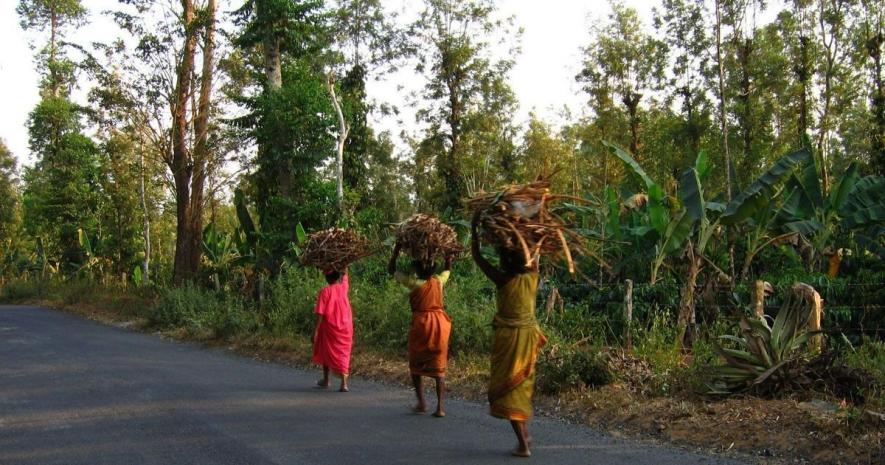Will Environment Ministry Address Concerns Raised by Tribal Ministry on Draft Forest Policy?

The proposed policy plans to bypass the existing forest laws, only to serve the private players at the cost of Tribes and forest dwellers.
As the new National Forest Policy (NFC) 2018 is expected to be finalised in less than a month, as declared by the officials of Ministry of Environment, Forest and Climate Change (MoEFCC), it is still unclear – to what extent the concerns raised from numerous quarters including Ministry of Tribal Affairs (MoTA) on various provisions of the draft policy will be addressed.
In March, MoEFCC had published a draft of the NFC 2018, and had received over 700 public comments in response to it. This policy, which will replace the 1988 policy, has attracted stringent criticism on various aspects – from keeping the definition of forest unclear to bringing in public private partnership models for “increasing productivity” of forests. MoTA also interfered in the matter which noted that MoEFCC does not have “exclusive jurisdiction” to frame policies related to forests.
Also Read: India’s Forests Under Threat Due to Irresponsible Govt. Policies
In a letter dated June 19, Leena Nair, the tribal affairs secretary wrote to CK Mishra, environment secretary, saying that MoEFCC is required to consult the Tribal ministry and forest dwellers before drafting such a policy. “The idea to bring out a forest policy is welcome, unfortunately, the policy has disregarded the traditional custodians and conservatives of the forests, namely, Tribals,” said Nair, and added that there was a general impression that the draft policy “gives a thrust to increased privatisation, industrialisation and diversion of forest resources for commercialisation.”
Referring to the Forest Rights Act of 2006 (FRA), she added, “It is also felt that the public private partnership models for afforestation and agroforestry detailed in the policy will open up the areas over which Tribal and forest dwellers have legal rights under FRA.” As per FRA, consent of Adivasis and forest dwellers is mandatory for any use of their traditional forest lands. However, news reports suggest that the environmental ministry does not seem to go back on PPP models and commercialisation of forests.
Also Read: Is the Draft National Forest Policy, 2018, an Attempt to Privatise Forests?
While the Panchayat Extension to Scheduled Areas Act, 1996, and FRA give the gram sabha authority over forests in Adivasi areas, the draft policy overrides this. “These two legislations are critical for the overall development of Scheduled Tribes and also make tribal community a key stakeholder in the management of resources as well as biodiversity conservation by ensuring the community-based forest governance,” wrote Nair.
Hundreds of civil society organisations have criticised the draft policy unanimously,claiming that it will only serve corporate interests. Alongside, it was pointed out that even the definition of ‘forests’ lacked clarity in the proposed policy.
The present regime under Prime Minister Narendra Modi has undermined the Tribal Ministry, a look at the budgetary allocations to the important ministry suggests.
Also Read: Assault on Environmental Regulations: Reaching a Peak?
Total allocation to this ministry, which is the nodal agency for tribal welfare, appears to have increased nominally from Rs.5329 crore in 2017-18 to Rs.5935 crore in the current year, but as a share of total expenditure by the government, it has shrunk from an already shockingly meager 0.25 per cent last year to 0.24 per cent this year. This postulates that the Tribal ministry is out of the government’s radar when it comes to allocation of funds. On the other hand, the meager funds allocated are also not spent as estimated. For instance, during 2017-18, while Rs 100 crore allocated under minimum support price for minimum forest produce, only Rs 25 crore was spent. Similarly, total allocation for the ‘Vanbandhu Kalyan Yojana’ comprising these and other welfare schemes has come down by nearly 17 per cent, after the government failed to spend nearly 21 per cent of last year’s allocation of Rs.505 crore.
In spite of laws ensuring forest governance rights to Adivasis, for decades, corrupt officials and politicians have undermined them. Now, the central government’s envisioned forest policy, if comes into rule, it will bypass the existing forest laws only to serve the private players at the cost of Tribes and forest dwellers.
Get the latest reports & analysis with people's perspective on Protests, movements & deep analytical videos, discussions of the current affairs in your Telegram app. Subscribe to NewsClick's Telegram channel & get Real-Time updates on stories, as they get published on our website.
























